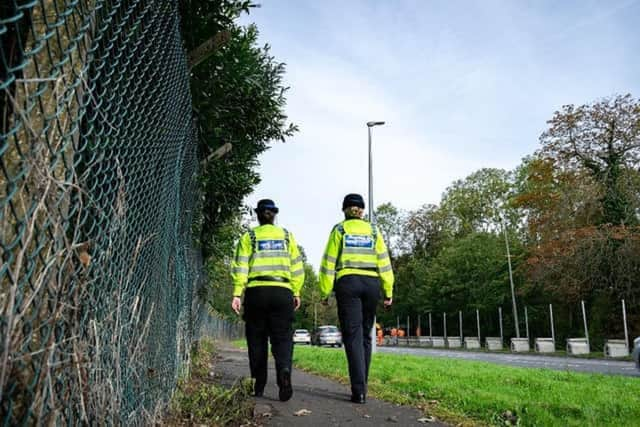Herts Police to spend less time supporting mental health patients under new approach
Police say they can spend around 19 hours in hospital waiting to hand over a single patient to medical staff Watch more of our videos on Shots! and live on Freeview channel 276
Visit Shots! now[1]POLICE in Hertfordshire are to limit the time they spend accompanying mental health patients in Emergency Departments - as part of a new 'Right Care, Right Person' approach. Currently the police say they can spend around 19 hours in hospital waiting to hand over a single patient - detained under Section 136 of the Mental Health Act - to medical staff.
But by April they want that to be limited to a maximum of one hour - enabling officers to get back to policing duties more quickly.

 Police stock image.
Police stock image.Photo: Police
The move - which will begin being phased-in in January - reflects a commitment toward the 'Right Care Right Person' approach (RCRP). That's an approach that has been designed to consider the role of the police and other sectors in delivering support those with mental health and other care needs. Ultimately it will mean police will be less likely respond to 'health emergencies' in the county, that do not otherwise require policing.
And the ongoing work to implement it was highlighted at the latest meeting of the Hertfordshire Health and Wellbeing Board. That work is focussed on four areas: 'concern for welfare' checks, those who are 'absent without leave' from mental health services, transportation and 'section 136' hand-overs. At the meeting it was reported that police in the county receive between 70 and 90 calls a day expressing concern for a person's welfare.
And they currently attend around 75 per cent of those calls, equivalent to between 52 and 67 a day. But under the RCRP approach, the aim is for these to be dealt with by other agencies - which could include health or social care, voluntary and community organisations, the fire service or the ambulance service. In addition police would no longer be routinely called-on if a patient who had been detained under the Mental Heath Act when 'absent without leave' - or if a patient left an Emergency Department unexpectedly.
And those needing transport for their physical or mental health would no longer be taken by the police, unless there were exceptional circumstances. But it is the the time taken to handover patients that police have detained under Section 136 of the Mental Health Act that is a primary concern to the Constabulary. Under section 136 of the Mental Health Act, police can detain a person who they believe needs to be seen by a mental health professional in order to take them to a place of safety.
But often when they do, they say they can face long waits after they arrive at a hospital. According to a report to the board, there are currently around 60 'Section 136' detentions a month. And between July and October delayed handovers were estimated to cost around GBP180k in 'police time'.
Under the new approach there would be an expectation that police will be able to handover those patients to 'crisis care staff' within an hour - with police only remaining 'in exceptional circumstances'. Even after the planned changes, police in Hertfordshire would still respond to a mental health related incident if a crime had occurred or was occurring or if there was a real and immediate risk to the life of a person. The 'phased' approach to implementing the changes will begin in January - with the aim of achieving one-hour Section 136 handovers by April.
Following the meeting a spokesperson for Hertfordshire Constabulary said they would be 'working closely' with health colleagues to support this activity - with plans to g'o live with a phased approach from early 2024?. "The Right Care, Right Person (RCRP) approach seeks to ensure the most appropriate service is given by the most appropriate agency and we fully support this model," said a spokesperson for Hertfordshire Constabulary. "We will of course continue to respond to high risk or violent cases where a police officer is required.
"This policy will reduce demand on policing to focus on our core duties - investigating crime, supporting victims, protecting the most vulnerable and responding to immediate threats, and it will ultimately result in the right care for those who are in crisis." Other areas - including London and Humberside - have already made changes to adopt the new approach. At the meeting chief executive of the Hertfordshire University Partnership Foundation Trust Karen Taylor said that those areas had invested to support workers to operate differently - and that it would need to be carefully worked through in the health and care system.
And she pointed to the planned opening of a 'crisis centre' that would also open in January.
The latest meeting of the Health and Wellbeing Board was held on Thursday (December 14).
References
- ^ Visit Shots! now (www.shotstv.com)